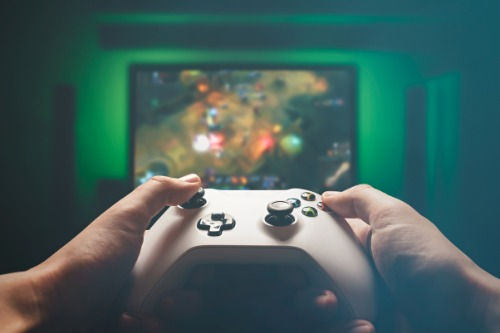Does Your Child Suffer From Internet Gaming Disorder (IGD)?
- Cindy Kinn

- Sep 21, 2022
- 4 min read

Online games are popular and entertaining, but can they be addictive? This question is still being debated among researchers and health professionals.
Internet gaming disorder, sometimes called IGD, was included in the Addendum to the Diagnostic and Statistical Manual of Mental Disorders, 5th Edition (DSM-5), found in Section III of the research appendix under conditions for further study - suggesting IGD is a form of behavioral addiction. Mental health professionals use the DSM-5 to diagnose mental disorders.

The general idea of IGD is the distinguished, overpowering desire to seek out new games and engagement in unlimited game playing to the point of neglecting other responsibilities even when negative consequences are realized and understood.
Following is information about IGD symptoms, risk factors, treatment options, and ongoing research.
International Perspectives
The World Health Organization (WHO) has included gaming disorder (GD) in the ‘Disorders Due to Substance Use or Addictive Behaviors’ in the International Classification of Diseases (ICD-11).
South Korea and China have recognized gaming disorders and have established treatment programs.
WHO Definition of IGD
IGD is “a pattern of gaming behavior (“digital-gaming” or “video-gaming”) characterized by impaired control over gaming, increasing priority given to gaming over other activities, and continuation or escalation of gaming despite the occurrence of negative consequences.”
It must be present for 12 months and be severe enough to affect functioning in other areas of life such as personal, family, social, education, and occupation.
Proposed DSM-5 Criteria for IGD
The proposed criteria for IGD require ongoing and recurrent internet gaming, causing clinically “significant impairment or distress” in several aspects of a person’s life. This proposed condition is limited to gaming and does not include problems with internet use, online gambling, social media, or smartphones.
Proposed Symptoms of IGD

At least five of the following proposed symptoms of IGD must be noticeable in the past 12 months:
Preoccupation with gaming
Experiencing withdrawal when internet gaming is not available or taken away (sadness, anxiety, irritability)
Development of tolerance, the need to spend more time engaged in internet games to satisfy the urge
Inability to control participation in internet gaming, unsuccessful attempts to quit gaming
Loss of interest in previously enjoyed activities due to gaming
Continued use of internet gaming while knowing the problems it is causing
Misleading family members or others regarding the amount of time spent on the internet gaming
The use of internet gaming to relieve negative moods, such as guilt or hopelessness, or as an escape
Has risked or jeopardized significant relationship, job, opportunity, etc., from involvement in internet gaming
Typically, those with IGD spend eight to 10 hours per day on the internet gaming and at least 30 hours per week.
Risks and Ongoing Research
Some argue those who met the criteria for IGD could have symptoms of underlying risks of co-morbidities such as ADHD, suicidal ideation, negative time perspective, elevated levels of social problems, low emotional intelligence, dysfunctional family relationships, or manifestation of maladaptive coping skills. Some recent neurological research shows similarities in changes in the brain between video gaming and addictive substances; however, whether IGD should be classified as an addiction/mental disorder is the subject of much debate and a growing body of research.
Research involving several studies of adults in the U.S., United Kingdom, Canada, and Germany found that 0.3 to 1.0 of the general population might qualify for a potential diagnosis of IGD. The researchers suggest an essential distinction between passionate engagement (someone enthusiastic and focused on gaming) and pathology (someone with an illness/addiction). Whether the person is distressed with gaming could also be a key factor distinguishing the two.
Diagnosis
Since this disorder is still being researched and debated, the criteria for diagnosing it may change.
Treatment
There is no established evidence of the effectiveness of any specific treatment. The methods studied have been primarily based on cognitive behavioral therapy (CBT) and can be done individually or in a group.
Research on medications for IGD is inconclusive. Bupropion shows some promise but remains in the initial stages of evaluation.
Even though there has been an uptick in clinical trials, methodological flaws prevent firm conclusions about the efficacy of any treatment for IGD. Additional well-designed clinical trials using standard metrics for assessing IGD symptoms are needed to advance the field.
In Closing
While many people engage in online gaming, those affected by IGD are a small proportion of this population.
If you feel like you or a loved one’s gaming is affecting your daily life and functioning, seek advice and help from a healthcare professional or mental health provider. They can still provide needed support and potentially treatment.

Cindy Kinn has a BS and MS in psychology with an emphasis in child development. With over 15 years experience teaching in the public-school sphere, she is currently a Media Psychology Ph.D. student at Fielding Graduate University. Cindy is focusing her dissertation work on contributing to the research on Internet gaming disorder (IGD), which is included in the Addendum to the Diagnostic and Statistical Manual of Mental Disorders (DSM-5) for further study. It remains to be examined what kind of disorder IGD could be. Is it a compulsion, an impulse control disorder, or a behavioral addiction? It may be up to the parent or gamer to decide whether they’ve become too dependent on gaming





























